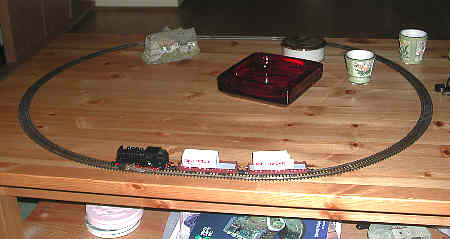
Copyright 2002 T. Sheil & A. Sheil All Rights Reserved
Table-Top Trains in 1/120 Scale

1/120 Scale trains were introduced in 1945 by Hal Joyce. Scaled for an engineer's ruler at 1/10 inch to the scale foot, TT was then the smallest commercially-produced model train. The designation "TT" is an abbreviation of "Table-Top". Joyce's HP Products manufactured the earliest of these delightful little models. Other makers such as Kemtron and Christoph were attracted to this newer, smaller train. TT could have exquisite detail and it was as fully functional as any other miniature train, yet ran in less space. The diminutive trains saw a burst of new adherents, but things cooled in the early 1960s. TT was eclipsed by the smaller N Scale.
TT's dimensions are about 73% of HO. To illustrate, the following tables were used so as to compare TT with the popular scales of the time, O and HO. They were originally used to promote TT's more compact size and thus the prospect of more action in less space.
This chart compares basic dimensions
| Scale | O (1/48) | HO (1/87) | TT (1/120) |
| Scale | 1/4" = 1 scale foot | 3.5mm (1/7")= 1 scale foot | 1/10inch = 1 scale foot |
| Scale in Decimals | 2.5" = 1 scale foot | 0-138" = 1 scale foot | 0.1 = 1 scale foot |
Here the size of prototype railroad equipment is used to show the compactness of TT against HO and O.
| Prototype Railroad Item | O | HO | TT |
| 40' box car | 10" | 5.508" | 4" |
| 70' Coach | 17.5" | 9.6" | 7" |
| 175' radius curve | 43.75"R | 24"R | 17.5"R |
Next we compare linear distances:
| Distance | O | HO | TT |
| 1/4 mile of track | 27.5 feet | 15 feet | 11 feet |
It was also pointed out that in a 5' by 10' layout, HO would encompass 8.7 scale acres, while TT was a whopping 16.5 scale acres.
TT is still supported by a small band of model railroaders here in North America. Its greatest popularity was in Eastern Europe, where it was made by East German firms like Berliner Bahnen and Rokal. Because of the nature of the Eastern Bloc, TT caught on as far away as Russia. In Britain, Tri-ang produced trains in 3mm scale, which used TT track. These ranged from 1/120 to about 1/100mm. The current major manufacturer is the German firm, Tillig. Here in America, several small cottage industries make a small range of TT track, trains and equipment.
Click here to see TT:
TT Technical Things: Couplers, Track, etc.
TT Equipment and German Rolling Stock
TT Scale is a challenge, since there is very little support. The original American manufacturers are gone. HP Products, Kemtron, Christoph, Jewel and others are gone. The prolific Berliner-Bahn and Rokal of Germany are also gone. Today, so far as I know, only the German firm Tillig continues to manufacture TT in any quantities. Their products are models of European trains. American manufacture is a matter of a few individuals producing small castings and parts.
What happened? TT was always a niche market in North America. It never gained widespread popularity. When larger firms started promoting N scale, TT was overwhelmed. In Germany, TT was big so long as there was an Eastern Bloc. They were the largest train maker in the Soviet sphere of influence. When the Berlin Wall fell, so did barriers to competition from the West.
TT might never grow to its former size, but it remains firm because of a few diehard fans. They enjoy the convenience of the scale and the challenge of running a scale which is virtually unsupported. A handful of individuals make a few items for the scale in the US. TT fans can find a small assortment of craftsman kits, track and scenery from which to build. I personally think that TT has potential. Larger than N, smaller than HO, it is perfect for display railways and small home pikes. You get a comfortable blend of : big enough to model, small enough for any space.
Click here to return to All Gauge Model Railroading main page